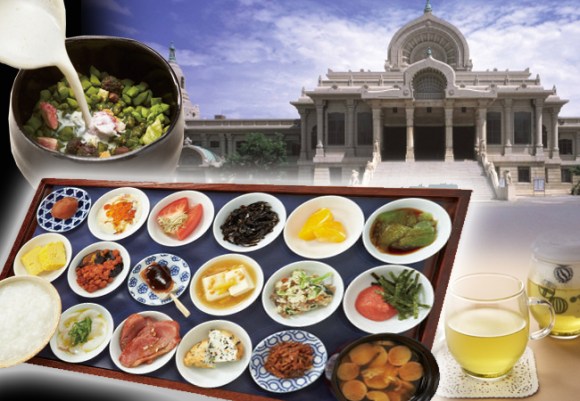
This 400 year old temple invites you to worship their wide array of cakes and teas.
Tsukiji Hongan Temple, located near the famous Tsukiji Fish Market in Tokyo, has existed in one form or another since the 17th century. However, these days the business of religion is stiffer than ever in Japan causing temples like Tsukiji Hongan to find new ways to attract visitors.
That’s why they’ve undergone renovations to add new and enticing facilities to their temple in what is called the Tera To Project (Temple And… Project). It includes an information center, book depository, gift shop, and more.
Perhaps the highlight of these modernizations is the Tsukiji Hongan Temple Cafe Tsumugi run by the cafe-bar chain Pronto. By combining modern tastes with more traditional sensibilities, Tsumugi has come up with a very enticing line-up of menu items.
At the top is the huge 18 Hinmoku No Asagohan which is a bowl of rice porridge and a bowl of miso soup for 1,944 yen (US$17). That might sound expensive until you hear that you can get free refills on each!
…Still too expensive? Okay, then how about 16 other side dishes to go along with it?
The total number of 18 dishes in this set is symbolic of the Buddha Amitabha’s 48 vows that enable us to transcend into the realm of the Buddha. Of these vows the 18th is said to be the most crucial. Here it is for those looking to enlighten themselves.
“Provided I become a Buddha, if the beings of the ten quarters who, after having heard my name and thus awakened their highest faith and aspiration of re-birth in that country of mine, even they have recollected such a thought for ten times only, they are destinated to be born there, with the exception of those who have committed the five deadly sins (Anantarya), and who have blasphemed the orthodox Law (Dharma), otherwise may I not attain the enlightenment.”
I would explain what that means, but I have no clue. Luckily, if you dine at Tsumugi a qualified monk will be nearby to teach you its meaning if you so desire. However, if the 18 Hinmoku No Asagohan is too big and esoteric for you, Tsumugi’s menu still has a lot to offer, such as this relatively leaner six-piece set for 1,100 yen ($10).
If it’s an elegant breakfast you’re craving, the Kyoto-san Arare to Uji Matcha no Wa-Granola Cappuccino Flavor for 918 yen ($8) is a good bet. With Japanese items sourced from Kyoto, this is far from typical granola, served with a cup of frothy steamed milk for a lushly colorful and natural bowl of goodness.
For those who aren’t early risers, the cafe is open all day, serving up a range of sweets such as:
Kakigori Hojjicha Kuromitsu Cream with Warabimochi which is a pile of shaved ice flavored with a cream that has dark molasses and charcoal-boiled green tea mixed in. This is all topped off with a jelly-like confection dusted in roasted soy bean powder (kinako) for 950 yen ($8.40).
Imo Yokan no Wasanbon Brulee (pictured foremost) which is a traditional Japanese gelatinous candy made with sweet potato and topped with fine wasanbon sugar which is then roasted to a crispy brown glaze.
There are also a lot of less fancy sounding but equally delicious looking treats like green tea roll cake, strawberry shaved ice, and twin parfaits.
There is also a plethora of teas available, suggesting that the name “Cafe” is merely a stylistic choice. They include:
▼ A “Japanese English Tea” made from ginger and kumquat
▼ A fine batch of partially shaded green tea (kabusecha) from Mie Prefecture
▼ And some take-home containers of Beppincha which promises beautifying effects.
It’s a solid line-up of foods that makes you forget you’re dining in a Buddhist temple. So, if you’re interested in some fine food in a tranquil atmosphere or want to learn more about Jodo Shinshu Buddhism in the most delicious way possible, Tsukiji Hongan Temple is the place to be, unless you can manage to invite a monk out to Tsuta some time.
Restaurant Information
Tsukiji Hongan Temple Cafe Tsumugi / 築地本願寺カフェTsumugi
Tsukiji Hongan Temple / 築地本願寺
Tokyo-to, Chuo-ku, Tsukiji 3-15-1
東京都中央区築地3-15-1
Open: 8 a.m. to 9 p.m. (seven days a week)
Source: Tera To Project
Images: Press Release, PR Times (Top image edited by SoraNews24)
[ Read in Japanese ]

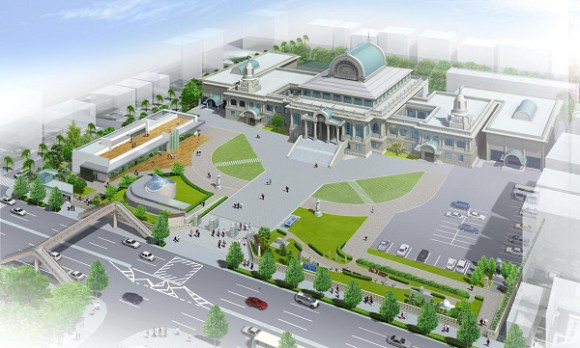
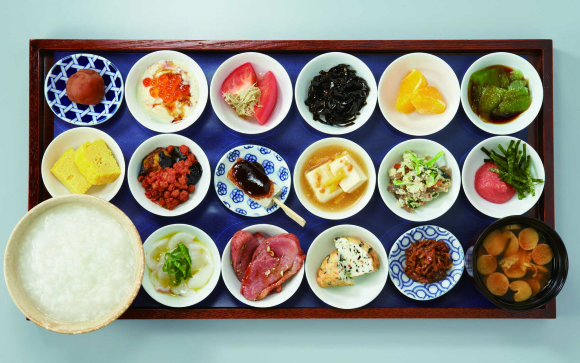
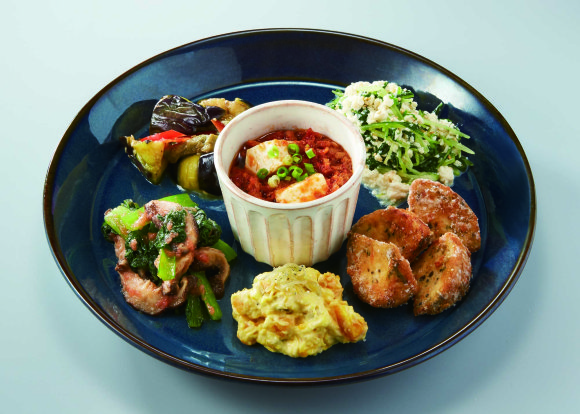

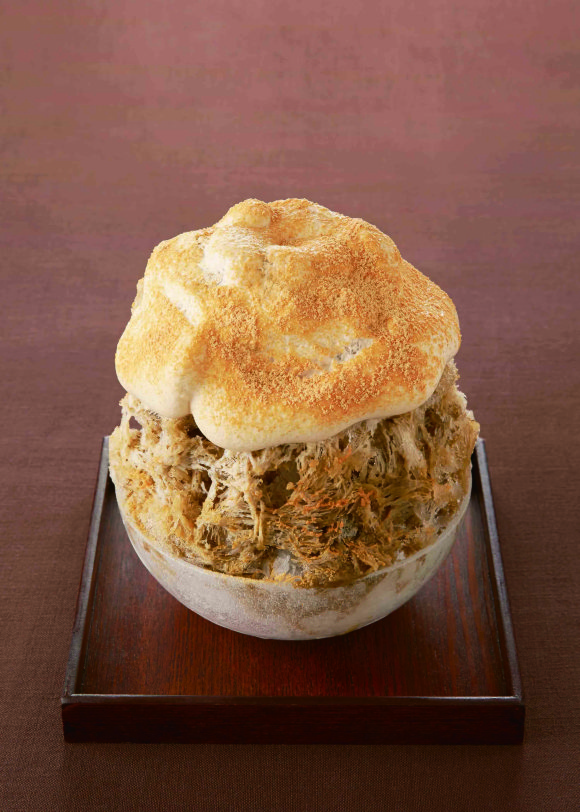
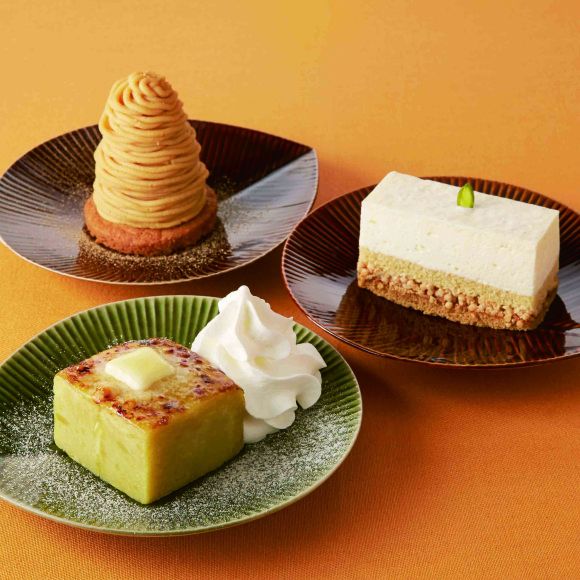
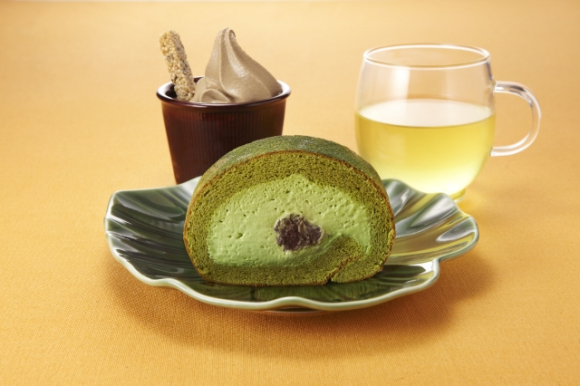

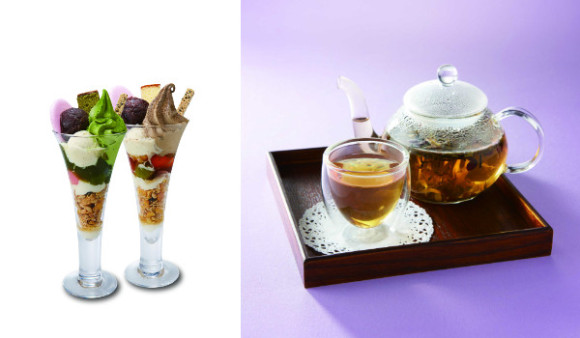
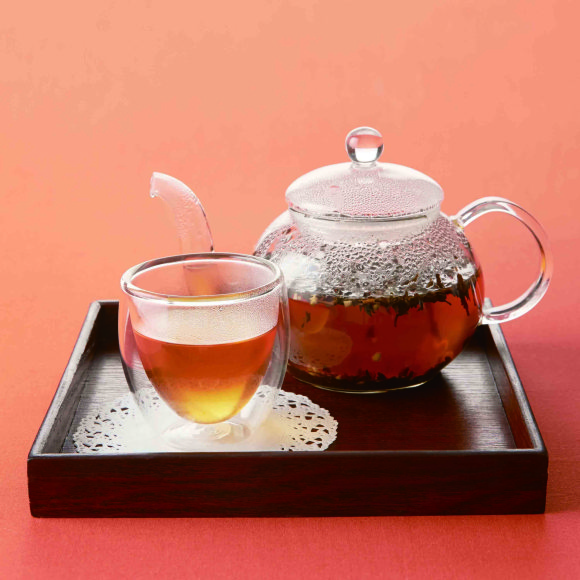

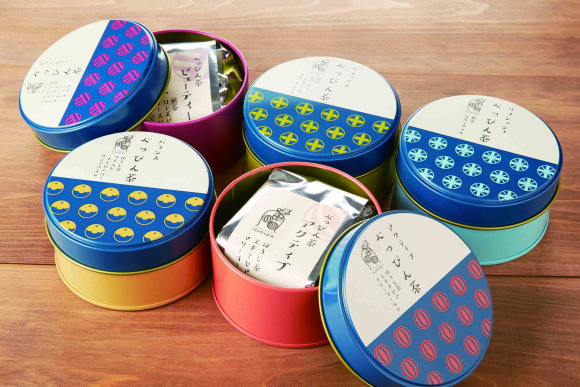
 Mr. Sato eats a Japanese sweet potato brulée so good that it just about knocks his socks off
Mr. Sato eats a Japanese sweet potato brulée so good that it just about knocks his socks off Tera Ango now offers the chance to live and take part in daily practices at a Buddhist temple
Tera Ango now offers the chance to live and take part in daily practices at a Buddhist temple Tsukiji alternative – Tokyo has a second fish market, and it turns out it’s awesome too
Tsukiji alternative – Tokyo has a second fish market, and it turns out it’s awesome too Mister Donut releases most intense matcha doughnut ever, in conjunction with Kyoto tea specialist
Mister Donut releases most intense matcha doughnut ever, in conjunction with Kyoto tea specialist Earn points by visiting temples throughout Japan with Buddhist sect’s upcoming app
Earn points by visiting temples throughout Japan with Buddhist sect’s upcoming app Starbucks releases special matcha Frappuccino made with Japan’s first matcha leaves of the year
Starbucks releases special matcha Frappuccino made with Japan’s first matcha leaves of the year Japanese public toilet tours become popular with foreign tourists in Tokyo
Japanese public toilet tours become popular with foreign tourists in Tokyo Tokyo’s beckoning cat temple asks foreign tourists to stop writing on the beckoning cats they buy
Tokyo’s beckoning cat temple asks foreign tourists to stop writing on the beckoning cats they buy Czech Republic makes multi-eyed mascot friend for Osaka’s multi-eyed Myaku-Myaku mascot
Czech Republic makes multi-eyed mascot friend for Osaka’s multi-eyed Myaku-Myaku mascot Tokyo DisneySea’s new Fantasy Springs area: Peter Pan’s Never Land has the best ride of all
Tokyo DisneySea’s new Fantasy Springs area: Peter Pan’s Never Land has the best ride of all Lots of Japanese parents want their kids to work for Nintendo, but not just for the money, survey says
Lots of Japanese parents want their kids to work for Nintendo, but not just for the money, survey says 2nd line of Casio watch rings hits Japanese capsule machines and we got the secret one!
2nd line of Casio watch rings hits Japanese capsule machines and we got the secret one! Starbucks Japan’s new Matcha Frappuccino: Brilliant beverage or drink disaster?
Starbucks Japan’s new Matcha Frappuccino: Brilliant beverage or drink disaster? Japanese Lolita fashion designers create amazing Madoka Magica dresses
Japanese Lolita fashion designers create amazing Madoka Magica dresses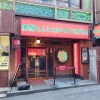 How to make a secret rice bowl at Ichiran ramen
How to make a secret rice bowl at Ichiran ramen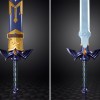 Life-size vibrating Legend of Zelda Master Sword for sale from Nintendo【Photos】
Life-size vibrating Legend of Zelda Master Sword for sale from Nintendo【Photos】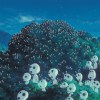 Yes, our new smartphone looks like at least two Studio Ghibli anime characters, Sharp says
Yes, our new smartphone looks like at least two Studio Ghibli anime characters, Sharp says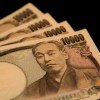 New Tokyo restaurant charges higher prices to foreign tourists than Japanese locals
New Tokyo restaurant charges higher prices to foreign tourists than Japanese locals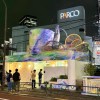 Japanese public toilet becomes a tourist attraction in Tokyo
Japanese public toilet becomes a tourist attraction in Tokyo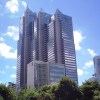 Tokyo’s famous Lost in Translation hotel is closed
Tokyo’s famous Lost in Translation hotel is closed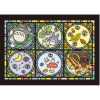 Studio Ghibli releases art crystal puzzles and folding umbrellas for rainy season in Japan
Studio Ghibli releases art crystal puzzles and folding umbrellas for rainy season in Japan Studio Ghibli releases new mug and tumbler collection featuring Jiji and Totoro
Studio Ghibli releases new mug and tumbler collection featuring Jiji and Totoro Mt. Fuji-blocking screen installed as response to bad tourist manners to be in place by next week
Mt. Fuji-blocking screen installed as response to bad tourist manners to be in place by next week Cool capsule toys recreate how Japan navigated trains in pre-smartphone days【Photos】
Cool capsule toys recreate how Japan navigated trains in pre-smartphone days【Photos】 McDonald’s new Happy Meals offer up cute and practical Sanrio lifestyle goods
McDonald’s new Happy Meals offer up cute and practical Sanrio lifestyle goods Foreigner’s request for help in Tokyo makes us sad for the state of society
Foreigner’s request for help in Tokyo makes us sad for the state of society “Mt. Fuji convenience store” issues apology for bad tourist manners, adds multilingual signs
“Mt. Fuji convenience store” issues apology for bad tourist manners, adds multilingual signs Japanese ramen restaurants under pressure from new yen banknotes
Japanese ramen restaurants under pressure from new yen banknotes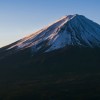 Bad tourist manners at Mt Fuji Lawson photo spot prompts Japanese town to block view with screens
Bad tourist manners at Mt Fuji Lawson photo spot prompts Japanese town to block view with screens Sales of Japan’s most convenient train ticket/shopping payment cards suspended indefinitely
Sales of Japan’s most convenient train ticket/shopping payment cards suspended indefinitely Sold-out Studio Ghibli desktop humidifiers are back so Totoro can help you through the dry season
Sold-out Studio Ghibli desktop humidifiers are back so Totoro can help you through the dry season Japanese government to make first change to romanization spelling rules since the 1950s
Japanese government to make first change to romanization spelling rules since the 1950s Ghibli founders Toshio Suzuki and Hayao Miyazaki contribute to Japanese whisky Totoro label design
Ghibli founders Toshio Suzuki and Hayao Miyazaki contribute to Japanese whisky Totoro label design Tokyo’s most famous Starbucks is closed
Tokyo’s most famous Starbucks is closed Doraemon found buried at sea as scene from 1993 anime becomes real life【Photos】
Doraemon found buried at sea as scene from 1993 anime becomes real life【Photos】 One Piece characters’ nationalities revealed, but fans have mixed opinions
One Piece characters’ nationalities revealed, but fans have mixed opinions We asked a Uniqlo employee what four things we should buy and their suggestions didn’t disappoint
We asked a Uniqlo employee what four things we should buy and their suggestions didn’t disappoint Eel-topped takoyaki is delicious in any season, but here’s why now is the best time to try it
Eel-topped takoyaki is delicious in any season, but here’s why now is the best time to try it Beef bowl chain Yoshinoya’s historic first store to close, special countdown site launched!
Beef bowl chain Yoshinoya’s historic first store to close, special countdown site launched! Buddhist metaverse “Teraverse” in development at Kyoto University, includes AI Buddha
Buddhist metaverse “Teraverse” in development at Kyoto University, includes AI Buddha Takoyaki store in Tsukiji serves up dried bonito flakes even bigger than the octopus balls
Takoyaki store in Tsukiji serves up dried bonito flakes even bigger than the octopus balls Starbucks releases special matcha Frappuccino made with Japan’s first matcha leaves of the year
Starbucks releases special matcha Frappuccino made with Japan’s first matcha leaves of the year Official Summer Pockets itasha listed on Yahoo! Auctions, comes with a bucketload of goodies
Official Summer Pockets itasha listed on Yahoo! Auctions, comes with a bucketload of goodies We miss out on cheap all-you-can-eat takoyaki, but stuff ourselves with octopus balls anyway
We miss out on cheap all-you-can-eat takoyaki, but stuff ourselves with octopus balls anyway Mister Donut’s strongest-ever matcha doughnuts are so intense they’ll bind with your DNA
Mister Donut’s strongest-ever matcha doughnuts are so intense they’ll bind with your DNA Seoul Cafe’s mint chocolate shaved ice is unlike any other shaved ice around【Photos】
Seoul Cafe’s mint chocolate shaved ice is unlike any other shaved ice around【Photos】 Tokyo confectioner’s Japanese-style seasonal chocolates look beautiful enough to decorate with
Tokyo confectioner’s Japanese-style seasonal chocolates look beautiful enough to decorate with Sushi Dai and other famous restaurants from Tsukiji fish market open at new Toyosu location
Sushi Dai and other famous restaurants from Tsukiji fish market open at new Toyosu location Cup of noodles for vegans! Japanese Zen Buddhist temple starts selling instant soba and udon
Cup of noodles for vegans! Japanese Zen Buddhist temple starts selling instant soba and udon Giant temple in mountains of Japan is also one of its most impressive tapioca bubble tea cafes
Giant temple in mountains of Japan is also one of its most impressive tapioca bubble tea cafes Seven places that aren’t Starbucks where you can get delicious sakura cherry blossom drinks in Japan
Seven places that aren’t Starbucks where you can get delicious sakura cherry blossom drinks in Japan Yaizu: Japan’s best sushi market destination even most foodies in Japan have never heard of
Yaizu: Japan’s best sushi market destination even most foodies in Japan have never heard of Temple camping in Japan at Wakayama’s Daitaiji【Photos】
Temple camping in Japan at Wakayama’s Daitaiji【Photos】
Leave a Reply